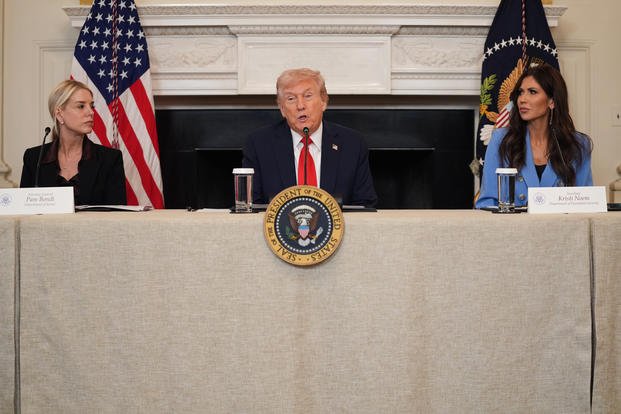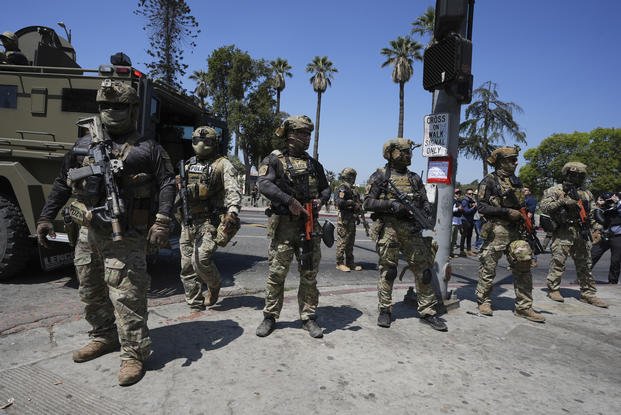President Donald Trump has considered applying the centuries-old Insurrection Act in order to circumvent court rulings and local objections to the deployment of military forces in U.S cities.
The Trump administration’s federalization of National Guard troops and operations in cities such as Portland and Chicago have led to legal challenges. It has also provoked widespread debate about presidential powers and civil liberties in times of domestic unrest.
Trump supporters’ backing of the invoking of the Act hinges on the president’s ability to use it to bring back order if states fail to do so. Opponents argue that such tactics involving widespread militarization are indicative of executive overreach.
What Is The Insurrection Act?
The Insurrection Act was first enacted in 1807 and provides the president with the mandate to activate federal troops domestically in exceptional situations.
It provides exceptions permitting military intervention when a request is made by the governor or legislature of the state seeking for federal help to conquer insurrection; federal law is impossible to enforce, especially due to violence or obstruction; or when protection of constitutional rights are neglected by states or when they are threatened.
The Act has been applied sparingly in the past. When there was an eruption of riots in 1992 in Los Angeles due to events surrounding the police brutality of Rodney King, President George H.W. Bush deployed forces to the region with agreement of then-California Gov. Pete Wilson. The situation emphasized the importance of state approval..
Though the Act provides authority, there are profound legal and political threats entailed in its usage. The public and courts have consistently scrutinized whether statutory thresholds are met by conditions.
A History of Controversial Invocations
The Act has been front and center in some of the most turbulent domestic times in U.S. history.
In 1957, troops were deployed to Little Rock, Arkansas, by President Dwight Eisenhower to enforce desegregation of schools when federal court orders were resisted by the government.
In order to protect and uphold federal mandates and protect activists, presidents depended on the Act during the era of civil rights. Presidents have typically stopped short of enforcing the Act during other periods of societal unrest.
President Trump’s 2025 Standoff
The deployment of National Guard units by Trump into Democratic-led cities was swiftly opposed by leaders from Oregon and Illinois.
Officials from Illinois, including Gov. J.B. Pritzker and Chicago Mayor Brandon Johnson, have argued that federalization of the military without approval goes against both constitutional limits and sovereignty. On Oct. 9, U.S. District Judge April Perry cited no significant evidence of a “danger of rebellion” and ruled against the Trump administration by disallowing national troops in the state for at least two weeks. The Trump administration appealed the ruling.
Oregon leaders previously had legal reprieve by way of a grant of a temporary injunction that stopped Trump’s orders, when a judge ruled that the administration had failed to demonstrate that state law enforcement was not capable of upholding order.
“We have an Insurrection Act for a reason,” Trump stated in a meeting with reporters in the Oval Office on Oct. 6. “If people were being killed and courts were holding us up, or governors or mayors were holding us up, sure.”

Trump’s Moves ‘Flatly Illegal’
Harold Koh, an international law professor at Yale Law School and former legal adviser at the U.S. State Department, told Military.com that any invocation of the Insurrection Act by the Trump administration in light of present circumstances “is flatly illegal.”
“The Constitution was designed to prevent [the] U.S. military from ‘dominating city streets,’” Koh said. “The Insurrection Act grants the president very limited authority to deploy the U.S. military and the National Guard for domestic law enforcement purposes.
“Those laws are not statutory blank checks, enacted in a constitutional vacuum, but were enacted against a historical background forbidding military intrusion into the domestic civilian space.”
He cited 10 U.S.C. § 252 which states that a president is only authorized to invoke the Act and deploy federal troops when direct resistance to the federal government caused by an actual revolt or insurrection makes it “impracticable to enforce the laws of the United States . . . by ordinary judicial proceedings.”
Jeffrey Swartz, professor emeritus at Cooley Law School in Tampa, Florida, told Military.com that what distinguishes a protest from an insurrection is the actual violence itself.
The legal question being brought about in courts is the issue of interference, which Swartz said is being pushed by the Trump administration as a response to protesters physically preventing U.S. Immigration and Customs Enforcement (ICE) agents from doing their jobs and carrying out the law.
But the allegations from the administration don’t match reality, he added, saying that purported fires and civilian disturbances in cities like Portland and Chicago are nonexistent and lack impetus to require National Guard troops. Local authorities’ purview includes quelling issues regarding civil disobedience.
“What’s going to happen, in my opinion, is that if [Trump] tries to invoke the Insurrection Act anywhere, there will be immediate action and he will have to go directly to the Supreme Court because they’re going to have to decide,” Swartz said. “Now that Court may say, ‘No, take it through the system, book an injunction.’ I don’t think that they’ll be able to use the shadow docket to try to help Trump out.”
His deepest concern is what occurs if the Trump administration does not prevail in the courts yet still disobeys the courts’ judgments.
While the Insurrection Act provides wide leeway, New York City-based attorney Nicole Brenecki told Military.com that it doesn’t let a president ignore court orders.
“Courts usually defer to a president’s decision to invoke the Act but can still review how troops act if constitutional rights are at stake,” Brenecki said. “Trying to use the Act to avoid court rulings would almost certainly trigger quick legal challenges, with courts likely reaffirming that no law permits the president to overrule judges.
“If such a move succeeds, it will greatly expand presidential emergency powers, blur the line between military and civilian, and set a precedent for future presidents to use the Act.”
Koh reminded how the Constitution is based on checks and balances.
“We did not rebel from a king, only to adopt a Constitution creating a new one,” he said. “In the Steel Seizure case in 1952, Justice Robert Jackson voted to block President [Harry] Truman from seizing the steel mills in Youngstown, Ohio, saying that the Framers ‘suspected that emergency powers would tend to kindle emergencies’ falsely based on pretextual presidential claims.”
Koh projects that Trump “can and will be sued by states objecting to this illegal practice.”
“Groups whose First Amendment rights are being restricted can sue to block deployments,” he said. “Congress should show some spine and resist this gross misreading of their statute. Most importantly, soldiers don’t need to obey illegal orders; they should instead obey their own oath to uphold the Constitution and laws of the United States—even when the president is plainly violating his.”
Constitutional Stakes
Should President Trump move ahead, the matter would likely move quickly to federal appellate courts and even perhaps the Supreme Court based on the constitutional stakes involving federalism, checks and balances, and arguments regarding civil rights.
Courts will have to determine whether the president’s claimed emergencies qualify within the historically narrow categories for invocation, and whether the executive can resist or override judicial injunctions without restoring separation of powers.
It may politically be a high-risk bet. If the president’s deployment is blocked or perceived as overreach, the controversy could serve as a rallying call against executive extremism. On the other hand, if some deployment is upheld it would translate to one of the most dramatic expansions of presidential domestic powers in modern times—a precedent that future leaders might refer to when confronted.
State governors, legislatures and Congress may respond by passing new statutory limits or by exercising political power. The coming days and weeks may settle not just legal boundaries but also the contours of a polarized presidential presidency.
Story Continues
Read the full article here





